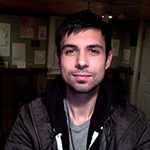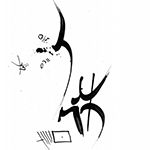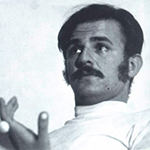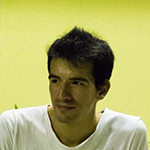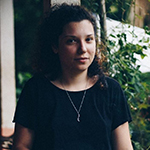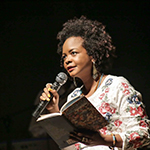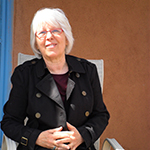happy few
Maybe you’re not the type who’s particularly interested in what I’m about to say here.
It could be because you think it happened so long ago that it doesn’t concern you—in fact, it never concerned you. Or you might think it happened so recently that it’s still too soon to talk about the subject with distance. Or maybe none of it ever interested you, not even when it was happening; or else it interested you so much that you became a part of it and therefore you already know exactly how it was, and talking about it makes you feel tired, so very tired.
This is your right, of course, and any one of these alternatives is perfectly acceptable. Though I’d prefer you to be the type of person who is indeed interested in the subject and wants to know more, either to refresh your memory or to truly understand it. The kind of person who, like me, thinks this story—whether big or small—has not yet been fully told. Not even close.
Still, while I am the second type of person, the curious thing is that, contradictory though it may be, I don’t like to remember those days, let alone talk about them. But I have my own reason for this. I know exactly why I don’t like it, and I can even explain it at the end—if we make it that far.
In any event, today, right here, right now, this is the story I have to tell.
A little story. One which takes place in a single day. A Friday.
A Friday much like any others in those years—scarcely imaginable nowadays and yet so close in time—when, as disconcerting as it seems, even for those of us who were right in the disturbed heart of that era, in this very city, São Paulo, there were bombs exploding in the streets, people robbing banks, police checkpoints stopping lines of cars at any time of day or night, soldiers fanning out across neighborhoods and at the drop of a hat mere passersby would unwillingly find themselves breathing in air contaminated with pure adrenaline and fear.
Those were the days of the dictatorship. The times of Garrastazu Médici.
A lot of things would happen that Friday.
The first thing to happen was a good thing: a small act of pamphleteering successfully pulled off at the break of a day that had started out dreary and overcast, but was now brightened by a sun that turned the air lightly golden, giving it the crystalline transparency of a São Paulo late-May morning.
Mara pulls up the collar of her jacket and smiles to herself. What a beautiful day!
Calm and collected, she has just exited the Estação da Luz train station, where she’d arrived a little earlier with three other companions in the 5 AM drizzle of the cold, still dark city. While two in their group acted as lookouts, one by each door at the main entrance, she and Clarice did some quick pamphleteering in the corridor to the stairways that led up from the train platforms.
They placed pamphlets denouncing the state of the nation into the hands of the workers who walked by, drowsy and barely aware of what was happening.
Some, the few who realized what those conspicuous young women in Lee jeans—one in a black jacket, the other in a navy blue peacoat—were up to, stopped for an instant and, startled, removed their chilly hands from their jackets and quickly grabbed the pamphlets extended to them, placing them immediately in their pockets, without looking left or right. Others passed straight by in a rush, late or else just frightened, barely raising their heads stuffed into their coat collars. They didn’t even look. Most of them, aloof, reached out their hands and took the piece of paper without the slightest notion of what it was. And they likely threw it away, crumpled and unread, at the first opportunity.
In a few short minutes, all the pamphlets that the girls brought in the bottom of their leather shoulder bags had been handed out. They head off in different directions like they don’t know each other. In the distance, a police car, its siren and lights off, approaches slowly like a black beetle.
Mara sighs in relief. She’s afraid, she always was, even when an action, like that morning’s pamphleteering, which was executed with care and respect for the norms of security, presented virtually no risk at all. She’d learned it as a student and it had become second nature. Somehow she’d gotten the hang of it, knowing more or less how to act. But she wasn’t a student anymore and the tenor of the repression wasn’t the same either. If she got caught, she’d be put in jail, and not as an ordinary young girl in trouble, but as a member of an urban guerrilla organization. She was scared; how could she not be? This sort of thing was no joke. So when everything worked out fine and was over with the relief was enormous.
She hurriedly climbs aboard the bus that runs to Duque de Caxias.
They were supposed to meet an hour later at the flower shop at Largo do Arouche.
Mara had time to have breakfast at a bakery nearby Avenida São João and that’s where she is now, seated on a stool at the counter. Without haste, she observes life around her preparing for yet another day. She feels a nice, familiar warmth spread inside her. The task accomplished without incident, the light of the morning, the yellow butter melting in the warmth of the crispy bread fresh from the oven and the taste of the coffee lightly burning her tongue.
She thinks of Alfredo who was still asleep when she left. In the early cold, before getting out of bed, she wrapped herself up in his warm body and he curled an arm around her, half asleep, pulling her closer.
As if it were possible to get any closer.
The alarm sounded the second time and Mara leapt from the bed. If she hadn’t done so immediately, she would have run the risk of surrendering to slumber, to laziness, and falling back asleep in the warmth of the body she loved.
She had no time for breakfast. She hardly had time to get dressed and rush out to catch the bus to the rendezvous where she was to meet the companheiro tasked with bringing the pamphlets.
Only now, at the bakery, does she have her coffee and milk with buttered bread.
She loves these calm motions of the day getting started. If she didn’t have such a soft spot for sleep, she would’ve liked to get up bright and early every day and watch the new sun in peace.
She’s happy.
Sometimes all it takes is a little chemical reaction to make a person feel like this, the way she feels now—this plain sense of well-being, her there with the morning sun rising over the city.
After the brief encounter with the others pamphleteering at Largo do Arouche—everything okay, everyone safe—they discussed the reaction of one guy, who must have been some kind of low-key weirdo. He took a pamphlet out of Mara’s hand and gave it to Clarice, and then went back to take a pamphlet from Clarice only to hand it to Mara. At that point the companheiros on lookout duty came over to tell them to wrap up the pamphleteering and leave the area, and the guy paused for a second, looking like he was considering whether to go back and do the same thing all over again, but he decided to go down to the platform, and take the train in meek alienation.
The shit you see!
Between chuckles, they confirm the rendezvous for the following day at 7 PM in front of the Belas Artes movie theater.
And as they’re saying goodbye, Clarice mentions:
– Hey Mara, I love that jacket of yours. What do you say we swap until Monday? You can have my peacoat.
– Sure, take it.
They trade—as they often did with blouses and dresses—the black jacket, well crafted with fine trimming, a gift from her mother, for Clarice’s ordinary navy blue peacoat with the silver buttons—and Mara heads to the newspaper where she works in the city center. It’s still early, the big elevator in the old building is empty. The silence is precious and cozy in the deserted corridors before the beginning of the beginning of the day, when the open spaces stretch out and hold their grip on the nocturnal shadows for as long as possible, while preparing to once again receive the daily routine—the movement, the heat and noise conjoined with the light as it streams obstinately in through the Venetian blinds.
Mara takes off Clarice’s peacoat. She’s no longer wearing jeans and sneakers, she got changed in the office bathroom as soon as she arrived, putting them in a plastic bag which she then placed in the bottom drawer of her desk in the newsroom. She let down her black hair, formerly tied in a ponytail, and put on some light eyeliner and a little mascara. Now she’s wearing black pantyhose, a burgundy miniskirt, black high heels and the same white blouse she’d had on with the jeans. She’s ready for the workday.
She adjusts her pantyhose, takes a seat and reads the day’s paper.
“Médici inaugurates hydroelectric plant in Northeast.”
“National Intelligence Service presents civilians with medals.”
“Zagalo maintains third Cup title is just the beginning.”
At half past noon, she’s standing by the entrance of Almanara, another rendezvous to deliver the stencil for an article to be published in the organization’s next internal bulletin. The publications for discussion between militants are printed on mimeographs; the modern, recently-acquired off-set is used for the pamphlets and flyers distributed to the masses.
The encounter is quick.
The afternoon sun had heated up the streets and people walk by carrying their sweaters in the brief warmth of the early afternoon.
The day remains beautiful.
Mara has a lunch date with two friends, but the three of them decide to have a light sandwich and use the rest of their free time to browse the bookstores in the center; Livraria Francesa, Ciências Humanas, Brasiliense.
At Brasiliense, one of them opens a book by Nietzsche. She tells them how she once sat in on a class about the philosopher and the subject of happiness. If she had understood the professor correctly, according to Nietzsche, metaphysics and Christian morality—dour, sullen and somber—were unable to accommodate the laughter and spontaneity of joy. That joy, happiness, life are here on Earth and not in some transcendental world.
“It made me curious,” Mara’s friend went on. As they spoke in lively voices, she made one swift and natural motion perceivable only to the two girls, one standing to her side and the other in front, and placed the philosophy book inside her large shoulder bag.
The three of them exited the bookstore like nothing had happened, happily discussing happiness according to Nietzsche.
Next they went to Livraria Francesa. Mara finds the latest issue of “Les Temps Modernes,” with articles by Frantz Fanon and Sartre.
She opens the magazine, reads a few paragraphs and wants more.
Displayed on a shelf at the back of the store, the paperback publication seems to be discreetly asking to be expropriated. Behind the human shield improvised by her friends—who understood Mara’s subtle gesture perfectly—she quickly extends her arm and slips the magazine inside her coat.
One of them then looks at her wristwatch, pretending to realize what time it is. “We’re late!” she says, and the three of them exit, absorbed in conversation, innocent.
They go to celebrate the spoils of their lunch outing with espresso at the galleria on Rua Barão de Itapetininga. They laugh loudly, content: they’re in their twenties, they just successfully engaged in two little adventures of cultural expropriation, and find the whole thing quite amusing.
The bookstores in the city are excellent. The espresso tastes good. Being twenty-something is joy in its purest state.
And, on top of it all, it’s a perfect day.
What else would they need to feel this little bit of euphoria? Ephemeral, it’s true, but is not the very essence of euphoria ephemeral?
What is it that Nietzsche said about this?
In the afternoon, Mara has a short pitch meeting.
Sometimes she wonders how she manages to lead this double life. A militant in a clandestine organization and a reporter for a bourgeois newspaper. Two opposites in a risky contradiction. But a legitimate job is fundamental in keeping up the facade of the clandestine life. Most militants have jobs and signed work cards, and their apartments are important as safe houses designated for the organization’s specific tasks. Mara’s apartment is one of these safe houses, and she finds two big advantages in her job: her work is reasonably interesting and the pay is enough to cover the bills for the two of them—Alfredo is a “professional” in the organization, exclusively dedicated to militancy. Now and then, she has the good luck to work on some important stories. She’s able to live this contradiction without losing it, without any real schizophrenia. She likes her work; she likes her coworkers. She feels at home in the tense atmosphere of the newsroom.
In the late afternoon, she takes the bus home. It’s moments like these that she’s able to examine, to observe the faces of the people, the faces of the multitudes. The lack of prospects, the exhaustion, the despondency. The sad poverty. This is what she sees at the end of every afternoon on the overcrowded buses. But she sees something else too, partially hidden among so many people, but if she looks closely she can see something else in those faces: a future. Something they all have a right to, just as she does. A much different future—and she’ll do whatever she can for them to get there as fast as possible.
At what moment did she decide to participate in all this, she sometimes wonders. And she knows the answer is that there wasn’t one precise moment: it takes time to make this sort of decision. Years. In her case, it took high school and college. A period in which she asked herself certain questions to understand what was going on around her and found, collectively and individually, satisfactory answers in a determined way of thinking. In many books, a great many arguments, in movies, songs, plays, conversations, so many conversations. She is part of a time of effervescence, of ongoing transformations, just look—see what’s happening in Paris, London, Peking with its Cultural Revolution, Prague, Berlin. And Brazil barred from experiencing this era of change by the repression of a dictatorship.
Mara feels a sort of physical reaction at the very thought of the word: ditadura. The most repulsive word in the Portuguese language.
As you can see, Mara is a romantic. She’s a romantic in that specific sense of an individual who thinks it possible to overcome the conditions put in place by the moment in which she lives, who believes that it is human nature not to accept what’s been imposed on you, to have the impulse to go beyond, to surpass, to transcend. This is the kind of romantic she is. This is her pedigree.
Mauro, a comrade from the Directory, is spending some time at the safe house where she lives with Alfredo, a small apartment with a single bedroom and living room in Lapa. It has a meager few pieces of second hand furniture: in the living room there’s a blue formica table and chairs, a small wood bookshelf and a standard bed with two mattresses and pillows that sometimes doubles as a sofa and accommodates guests on nights like this one. In the bedroom, a simple standing closet and another simple single bed where she and Alfredo sleep. In the kitchen, a stove with four burners, a new refrigerator and a small cupboard. In the bathroom, a small medicine cabinet and a hamper for dirty clothes. In the tiny service area, a second hand washing machine.
This sort of standard safe house decor doesn’t even allow a single poster on the wall, unless it’s something neutral like a landscape scene. If neighbors or strangers were to enter the apartment, they are to see nothing that would insinuate any sort of left-wing sympathy. That’s why the books by Marx, Engels, Lenin, Mao, Sergio Buarque, Caio Prado all had to be hidden. Only novels could left out in the open, and not all of them. On a wood bookshelf in the bedroom, a typewriter is hidden, one of the heavy ones, capable of cutting stencils.
On the shelves alongside the books are seashells collected on Tenório Beach during a holiday in Ubatuba, a caricature drawn by one of Mara’s coworkers in the newsroom, a present that aroused a certain jealousy in Alfredo, though he never said anything about it, a colorful straw fan bought at the market at Praça da República, a chessboard with a slip of paper which reads “Monthly Championship,” with two columns of marks – one labeled ME and the other HIM in capital letters. At the back of the closet and under the bed, documents from the organization, and the books by left-wing authors.
On top, inside a white shoebox, are the guns—two 38s, a 7.65 mm pistol—and some ammunition.
Mara was no good with guns. She never got used to the sensation of holding one: it made her feel unreal. The actual weight of a gun was something she never knew how to calculate well and it always surprised her. In all the training sessions in which she participated since having joined the organization, she never managed to hit any of the targets, not even the big ones. And before anyone could tease her for her incompetence, she was the first to laugh and label herself the Renitent Pacifist. Still, she didn’t worry about it too much: she knew her work would be in the rearguard, not the front lines.
Next to the guns, in another white shoebox, are some family photos and letters. There’s also a small notebook. Not a diary, it would be reckless to keep a diary under those circumstances, but a notepad in which she wrote poems, little stories, texts with no beginning and no ending. It’s one of the rare personal things in the apartment. Aside from her and Alfredo’s few articles of clothing, a couple of necklaces, bracelets, Indian rings and earrings, which she couldn’t live without.
There’s also a braided rug on the floor in front of the closet. And a piece of paperboard on the bed headboard with elaborate letters written in Pilot pen:
“We must dream, but with the condition of making our dreams come true. ” —Lenin
I always liked that poster. I wish I had been like Mara: to have that romanticism, that goodness to believe that a phrase written on a paperboard tacked on the wall could provide some kind of power or inspiration. I wish I had been like that. Even more so, I wish I were like that now. To still have that lightness.
This was the apartment. These were the decorations. That was all.
And still, inside that “safe house” with its less than hospitable decor, there was something else, and that something was what dominated and united them and made them what they were. The indefinable feeling that was born out of an energy concentrated there, in the enthusiasm, in the sense of fulfillment and achievement. The unity that comes from fighting for something they believed in, with all the enthusiasm of youth—against injustice, against exploitation. The fight for the construction of a different society.
An end and a beginning.
That is what made them a band of brothers.
On this Friday night, after spending the day in a meeting there in the apartment, Mauro made dinner. He’s an excellent cook: he made a roast with browned onions and sides of fluffy white rice and beans. He explains how to make the roast to Mara. It’s simple: just rub the eye of round with salt, fry it in a bit of vegetable oil until it’s browned on both sides and then put in the oven, nestled among whole, peeled onions.
The meat sizzles as he cuts it into slices, the oil still seething. A tantalizing aroma spreads throughout the small living room.
They wrap the table in newspaper and serve themselves directly from the pot, campfire-style, eating the roast on top of the abominable headlines of the day.
The three of them had intended to go see a movie, Yellow Submarine. But Alfredo showed up with red eyes, irritated from the contact lenses he’d just started wearing. The lenses are new to the market, and they’re hard, cumbersome, difficult to adapt to. During the last action in which he participated—the “temporary expropriation” of a car to be used to “expropriate” a bank—he nearly got his glasses knocked off. From that point on, he decided to wear contacts. Now his eyes are burning and red; better not to strain them.
Furthermore, they had another special house guest aside from Mauro—one who would have been unable to go with them to the movies. He’s obligated to lay low for a while: his picture is on wanted posters scattered all over the city. He spent the week there without setting foot outside, and he has a rendezvous later on that will take him out of town.
They’re staying in to keep him company and have a little farewell party.
Mara hadn’t known him before. That morning at Estação da Luz, she saw his face in an old photo on the wanted poster: bushy black hair, a beard, glasses, huskier. He’d asked that she buy some dye to lighten his hair, and when she got home from work at the end of the afternoon, the first thing she did was to sit him on a stool in the white-tiled bathroom. She placed a face towel on his shoulders and began applying the products to bleach and then color his hair, following the instructions. First she cut it. She was handy at these things and found herself pleased with the outcome: the hair, cropped short, bleached and dyed light brown, didn’t look fake. It looked like it had sprouted naturally on the head of that young man with the slightly dark complexion and chestnut eyes opening wide to a fate suddenly so far out of his control.
And there they are, conversing in the small living room that Friday night. They’re calm, they have a path forward. They feel good.
The danger is out there—in the scent, in the cold, in the fragmented light of the night—but it’s not in them.
The night is cold, moonless.
Alfredo goes down to the corner bar to buy some wine and cognac for the farewell party. He gets jug wine, “Sangue de Boi,” but they’re young enough for second-rate booze. The cognac is Dreher.
They tell stories. They laugh.
Mara draws closer to Alfredo and holds him tight. How she loves him! They’ve been together since their senior year of college and she hopes to spend the rest of her life like this, by his side, together, inside of something larger than the two of them.
She asks him in a whisper:
– Are you happy?
– You know I am, he smiles.
She teases him:
– Do you know what Nietzsche wrote about happiness?
– Nietzsche? He didn’t know. But it makes sense. Every great thinker has had to deal with it, the base of the great human question: why are we here, after all? To suffer, or to be happy?
They listen to Joan Baez, Peter Seeger, Chico, Caetano; they sing the lovely refrain, “El nombre del hombre es pueblo,” loud, over again and again.
The house guest has a nice voice and he drums a Mangueira samba on the table. Mauro accompanies him on the matchbox. The lyrics sing of dead leaves, dead leaves being stepped on. His voice goes down to some unknown depths, and from there it brings up a sweet inflection, a longing, a warm sentiment of something good.
The house guest doesn’t know it yet, but, in the early morning hours, he’s going to be arrested.
He’s going to be tortured. They’ll hang him upside down from a crossbar, the bleached hair dangling from his head, and apply electric shocks to his anus, his nostrils, his ears. They’ll shove his face into a tank of water and make him think he’s dying. This young man with the generous eyes will be torn apart. They will try to break him and conquer him. They will forever mark his youth and memory, darkening the unacceptable light in his eyes.
At the midnight rendezvous, he’ll be ambushed by the police.
Mauro will drop him off two blocks from the spot where he is to meet the companheiro who will take him out of town. He’ll walk around the block, waiting the ten minutes permitted in the event of a delay.
No sign of anyone.
He’ll start to wonder: might there have been a misunderstanding? Had the rendezvous actually been set for 12:30? The streets are quiet and, after so many days cooped up inside the safe house, the pure night air is more intoxicating than the wine he drank.
He doesn’t go back to the spot where Mauro is to wait ten minutes for him. Disrespecting the norms of security, he decides to stay.
That’s when the police come for him.
And then, not too long after, just a few days later, Mauro, Alfredo, all of them are arrested, one by one.
And Mara is killed.
Armed police officers, strong, rough men, on the Sunday night after that Friday, another cold, moonless night, will invade the safe house where Mara and Alfredo live. They’ll throw out the shoebox containing their personal belongings. One of them will take her necklaces, earrings and bracelets for his girlfriend, wife, or mistress. Another will indifferently tear the small poster off the headboard, ripping it and sneering: these two must suffer from insomnia. Still another will stomp on the bed, splitting the wood base in two.
The books on the shelf will go on the floor, and also be trampled. The formica table, the furniture, turned upside down, as if to symbolize something. The pots and pans and dishes and utensils will be examined. If deemed worthwhile, they’ll end up in one of their homes.
The caricature of Mara drawn by her coworker in the newsroom will be stepped on several times.
They broke in guns blazing. Mara didn’t even try to go for the shoebox at the top of the closet. What for? She’d never hit a target, not even any of the big ones, remember? She couldn’t even calculate the weight of a gun correctly. She was totally inept at it. And even if she had been the greatest target shooter of all time, she still wouldn’t have made it. They’d arrived thinking they would find Mauro in the apartment, and they came in with fury as well as fear. They wanted Mauro wounded, ready to talk.
But it was Mara who was sitting in the chair in front of the door, who was startled to her feet, making her the perfect target.
I think now’s the time to tell you what I said I would at the beginning.
I’m Mara’s friend, the one who handed out pamphlets with her that Friday, the one who studied philosophy. I’m Clarice. That same Friday night, I got arrested, far from there and—now I’m going to say it quickly and quietly—iwastortured. Not too much, not to the point of near-death or madness, but enough, I’d say. Plenty.
I wanted, I tried, I wished—for this story to be a beautiful one and to only have that first part, the part with the happiness. But I know it’s impossible to be so partial. Against my will, I find myself obligated to enunciate this obscenely ugly first-person statement in the Portuguese language.
On a beach one night after I got out of jail, there in the middle of the water that lapped against me and came and went and came again, the deserted beach, the mirror of the dark ocean on a night with no moon and no stars and yet with something of an iridescent silver in the reflection of the water, something of a bristly luster, a luster of oil and ash, I thought to myself I’m going to say it out loud, I’m going to speak it, and I said it and I spoke it and I screamed it out, I yelled that first-person statement many, many times until my voice went hoarse, until I felt exhausted and stupid, so very stupid. I once saw this movie—I don’t remember the title—where a girl stands beside some train tracks, waiting for a train to come so she could let out a scream and alleviate the pain she felt. And someone also told me that screaming with all your might could force part of the problem out and you lose some of the weight you have locked up inside you.
I didn’t.
I continue to avoid even thinking about the hideous enunciation as much as I can and when, for some reason, I have to remember it, like now, and utter it, I say it as quietly and as quickly as possible, but always with a tremor—either a weak one, almost imperceptible, or very very strong, doubling my frame. A tremor that has never, ever left me.
The thing about torture is that it divides the tortured person in two: it pits your body against your mind. It uses your body so that your mind betrays your ideas, your companions, your beliefs. It tears a person apart: on one side, the thinking mind threatened, on the other, the wounded body in pain. And this person, the victim, can try to heal, to mend, to stitch the parts together afterward, but the seams remain. You can’t just rub an eraser over them and pretend this division never existed.
The stitches stay there forever.
I was lucky, in a way, very lucky, because, at a certain point, I had some kind of epileptic fit. I passed out. They got scared and had to stop before I reached my limit. The limit where I’d start to betray myself.
But before that, before I passed out, even before they asked me the first questions, gave me the first slaps, shocks and kicks, they took off the black jacket that I was wearing. Mara’s jacket. In the bottom of one of the pockets of the finely crafted jacket with the perfect trimming that her mother had given her, they found a slip of paper: the receipt for the final installment—paid just days earlier—of a new refrigerator.
After that, all they had to do was put two and two together to find her address .
They spent hours staking the place out. They saw Mauro, wanted in several states, going in. They saw Alfredo, whom they couldn’t identify but seriously suspected, going out to buy bread.
They broke in guns blazing.
Now you know why I don’t like talking about those days.
But if you asked me about that time, if you asked the question that you might feel tempted to ask after reading the story of that Friday like so many others in the lives of Mara and her companheiros, a simple question—were you happy back then?—I would tell you clearly and sincerely and without hesitation that I was. Like Mara, Alfredo, Mauro and the house guest, I’d say yes. It was a time of friendship, solidarity and small joys that are perhaps only possible in such days.
And, still, almost all of them, almost all of us, one by one, were arrested or killed or forced into exile.
Were we beaten?
Who can tell?
Only life can say if by losing the battle, with it, we lost the hope and joy of being who we were and who we are.
This band of brothers.
translator’s note:
I met Maria José Silveira in early 2015. She got my number from a shared acquaintance after mentioning she was looking for an English teacher. And though I wasn’t a teacher, I had filled the role of conversation facilitator—effectively giving people with working knowledge of English an opportunity to practice their language skills– off and on since moving to Brazil. And so it was with Zezé.
She and her husband Felipe welcomed me at their apartment behind Avenida Paulista. In the front room, they had a round, mosaic tile table overlooking the entrance to the Nove de Julho tunnel with its ever-flowing streams of traffic and the unmistakable sight of the São Paulo Museum of Art perched above it. As soon as I saw the view, I realized I’d been there before—not in their apartment, but the one next door. On election night 2006, I was with a group of friends watching the vote count on TV and, once it was clear that Lula had been reelected, we all headed downstairs to join the multitude already celebrating and see the president give his victory speech on the avenue in front of the museum.
Aside from being one of the most distinctive buildings in the city, a Brutalist rectangular block of glass and concrete sitting on reinforced pilotis, MASP is also the go-to gathering point for every sort of political demonstration and protest. And in the two years that Zezé and I met there for class, there were demonstrations every single week, often more than one, and the mood on the streets was a far cry from what it had been nine years earlier.
We’d sit at the table and talk about whatever was on our minds– movies, TV, exhibitions we’d seen, writers we admired, those we thought were overrated, topics that interested us deeply—and somehow our conversations always seemed unfinished due to time constraints. Sometimes Felipe would join us and they would give me advice on married life, my impending fatherhood and the particulars of bringing up children in São Paulo. We’d also talk about her work, of which I became an avid reader. When she showed me a collection of then-unpublished stories set during the dictatorship era, I offered to try my hand at translating them—an offer Zezé accepted. In my first attempt at literary translation, I had the privilege of firsthand access to the author, who in turn was willing to help me come up with the best possible rendering of her work in my native language. Our classes turned into careful reading sessions and we’d sit at the mosaic-tiled table poring over over printouts of my translations, debating, arguing, flipping through dictionaries and jotting down shorthand notes of inadequately resolved phrases that would have to be revisited.
All the while MASP was right there across the way, crowds gathering, bullhorns blaring, chants and cheers erupting, drums pounding as the country careened off the rails, barreling toward places of ugliness and uncertainty, places one might have imagined were unreachable at that point in history.
When Felizes Poucos, that short story collection whose titular piece is translated here, came out in 2016, Zezé presented me with a copy and signed it “Dear Matt. I hope you never live through times like these.” I thought to myself, “Well, that’s a bit much,” naively assuming they were long gone.

Born in Hartford, Connecticut in 1979, Matthew Rinaldi earned a BA in English from Fordham University in 2002. The following year he relocated to São Paulo, Brazil, where he would reside for 15 years. During that time, he developed a career as a translator specializing in contemporary art and worked for the country’s most prominent museums and cultural institutions. Rinaldi also accumulated a scattering of writing credits, penning chapters for Jonathan Runge’s Rum & Reggae’s Brasil, articles on the FLIP literary festival for Gobshite Quarterly and a feature on urban farming in New York City for the Brazilian magazine RED Report. He is currently translating a survey of the history of photography and modern painting by Claudio Edinger.

Maria José Silveira is a Brazilian author and translator. Born in the state of Goiás in 1947, she studied communications at the University of Brasília, and relocated to São Paulo after graduation. In her twenties, Silveira was involved in the resistance against the country’s military dictatorship. After her husband’s arrest, she was forced into hiding and, upon his release, they went into exile in Peru where Silveira earned a degree in anthropology from Universidad Nacional Mayor de San Marcos in Lima. Back in Brazil after the transition to democracy, Silveira founded Editora Marca Zero, working as chief editor for over a decade. Her first book won the 2002 APCA award for debut novel. It was published in English by Open Letter Books in 2017 under the title “Her Mother’s Mother’s Mother and Her Daughters.”

 BACK TO ISSUE
BACK TO ISSUE